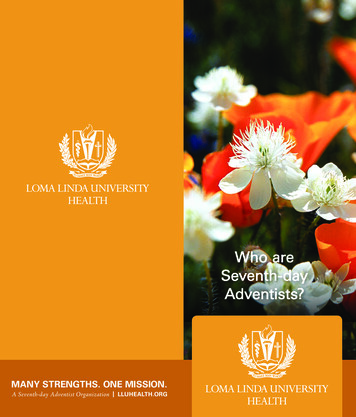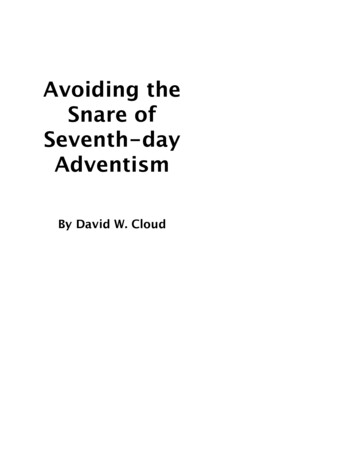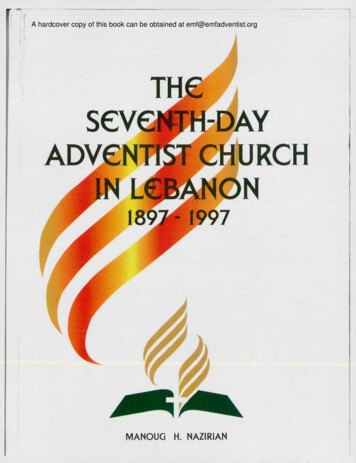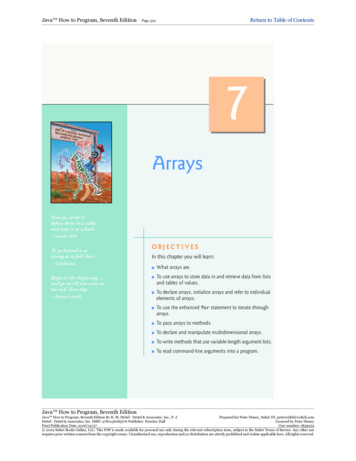
Transcription
BABCOCKUNIVERSITYA Seventh-day Adventist Institution of Higher LearningIlishan-RemoNigeria2019-2023Undergraduate Bulletin
CONTENTSCorrespondence DirectoryMeet the President/Vice ChancellorOur Mission StatementContentBabcock University Programmes by Schools and DepartmentsAcademic Calendar2456WELCOME TO BABCOCK UNIVERSITYMANAGEMENT SERVICES DIVISIONFINANCIAL ADMINISTRATIONSTUDENT DEVELOPMENT DIVISIONACADEMIC DIVISIONBU Assessment Philosophy and PolicyAcademic HonestyGrievance ProcedureGeneral Graduation RequirementsEducation Support ServicesCOLLEGE, SCHOOLS AND DEPARTMENTS AT A GLANCEBENJAMIN S. CARSON COLLEGE OF HEALTH AND MEDICAL SCIENCES (Schoolof Basic Medical Sciences, School of Basic Clinical Sciences, School of Clinical Sciences,School of Nursing, and School of Public and Allied Health.1. SCHOOL OF BASIC MEDICAL SCIENCESDEPARTMENTSDepartment of AnatomyDepartment of BiochemistryDepartment of Nutrition and DieteticsDepartment of Physiology2. SCHOOL OF BASIC CLINICAL SCIENCESDEPARTMENTSDepartment of Chemical PathologyDepartment of Haematology and ImmunologyDepartment of HistopathologyDepartment of Medical MicrobiologyDepartment of Pharmacology and Therapeutics3. SCHOOL OF CLINICAL SCIENCESDEPARTMENTSDepartment of Community MedicineDepartment of Internal MedicineDepartment of Paediatrics
Department of Obstetrics and GynaecologyDepartment of Surgery4. SCHOOL OF NURSING SCIENCEDEPARTMENTSDepartment of Adult HealthDepartment of Community HealthDepartment of Maternal and Child HealthDepartment of Psychiatry and Mental Health5. SCHOOL OF PUBLIC AND ALLIED HEALTHDEPARTMENTSDepartment of Medical Laboratory SciencesDepartment of Public HealthOTHER SCHOOLS6. SCHOOL OF COMPUTING AND ENGINEERING SCIENCESDEPARTMENTSDepartment of Computer ScienceDepartment of Information TechnologyDepartment of Software Engineering7. SCHOOL OF EDUCATION AND HUMANITIESDEPARTMENTSDepartment of EducationDepartment of History and International StudiesDepartment of Languages and Literary StudiesDepartment of Music and Creative ArtsDepartment of Religious Studies8. SCHOOL OF LAW AND SECURITY STUDIESDEPARTMENTSDepartment of International Law and Security StudiesDepartment of Jurisprudence and Public LawDepartment of Private and Commercial Law9. SCHOOL OF MANAGEMENT SCIENCESDEPARTMENTSDepartment of AccountingDepartment of Business Administration and MarketingDepartment of FinanceDepartment of Information Resources Management10. SCHOOL OF SCIENCE AND TECHNOLOGYDEPARTMENTSDepartment of Agriculture and Industrial TechnologyDepartment of Basic Sciences
Department of Microbiology11. VERONICA ADELEKE SCHOOL OF SOCIAL SCIENCESDEPARTMENTSDepartment of EconomicsDepartment of Mass CommunicationDepartment of Political Science and Public AdministrationDepartment of Social WorkUNIVERSITY GOVERNANCE PROFILEBABCOCK UNIVERSITY BYE- LAW
CORRESPONDENCEDIRECTORYCopies of this Bulletin and Departmental Student Handbook are available at the time ofregistration. Enquiries may be made to:The RegistrarBabcock University, Ilishan Remo,Ogun State, NIGERIAWEBSITE: www.babcock.edu.ngPhone Numbers: (234) 8162835333, 8183277727, 8158628568, 8126456667Website: www.babcock.edu.ngE-mail(General): registrar@babcock.edu.ngLocation Address:Ilishan-Remo,Ogun State, NigeriaEnquiriesFor:Address To:Academic Affairs.Senior Vice President/DVC, Academics:svp.acad@babcock.edu.ngManagement Services Senior Vice President/DVC, Management Services: svp.mgt@babcock.edu.ngAccounts.Deputy Bursar: deputy.bursar@babcock.edu.ngAdmissions . The Registrar:registrar@babcock.edu.ngAlumni, Development & Strategy .Director, Alumni Affairs: alumni@ babcock.edu.ngBU Press .Director, BU Press:bupress@babcock.edu.ngBU Ventures.General Manager Ventures:buventures@babcock.edu.ngBooks & Publications.Manager, University .University Pastor:varsity.pastor@babcock.edu.ngCommunication & Marketing .Director, Comm. & Marketing:cio@babcock.edu.ngCommunity Relations.Director, Ext . & Logistics and Protocol: dir.ealp@babcock.edu.ngCounseling Services.Director, Student Support Centre:dir.ssc@babcock.edu.ngEmployment Matters .Director, Human Resources: hr@ bacock.edu.ngEndowments &Trusts.Bursar: vpfa@babcock.edu.ngEvaluation of Certificates.The Registrar: registrar@babcock.edu.ngFinancial Assistance.The Bursar: vpfa@babcock.edu.ngFood Services.Director of Food Services: dir.fs@babcock.edu.ngGeneral Business Matters.The Bursar: vpfa@babcock.edu.ngGeneral University Interest.The Vice-Chancellor: vc@babcock.edu.ngIperu Campus .Provost, Iperu Campus: Provost.iperu@babcock.edu.ngLegal Services.Director, Legal Services: legalunit@babcock.edu.ngOffice of Institutional Effectiveness .Associate Vice President, IE:oie@babcock.edu.ngPlacement Service.The Registrar:registrar@babcock.edu.ngResearch Innovation and International Cooperation.RIIC:riic@babcock.edu.ngSchool of Science and Technology .Dean, SAT:dean.sat@babcock.edu.ng
School of Management Sciences. Dean, SMS:dean.sms@babcock.edu.ngVeronica Adeleke School of Social Sciences Dean, VASSS: dean.vasss@babcock.edu.ngSchool of Computing and Engineering Science Dean, CES:dean.sces@babcock.edu.ngSchool of Education & Humanities.Dean, EAH:dean.eah@babcock.edu.ngBenjamin S. Carson College of Health & Medical Sciences Provost:provost.buchms@babcock.edu.ngSchool of Law and Security Studies.Dean, LSS:dean.lss@babcock.edu.ngSchool of Nursing .Dean, Nursing: dean.son@babcock.edu.ngSchool of Public and Allied Health .Dean, PAH:dean.sph@babcock.edu.ngCollege of Postgraduate Studies.Provost, Postgraduate Studies: provost.pgs@babcock.edu.ngStudent Support Services.Dir. Stud. Supp. Centre: dir.ssc@babcock.edu.ngStudent Finance.The Bursar: vpfa@babcock.edu.ngStudent Welfare and Housing.Vice-President, Student Development: vpsd@babcock.edu.ngTeacher Qualification.Senior Vice President, Academics: svp.acad@babcock.edu.ngTranscripts and Records.The Registrar: registrar@babcock.edu.ngUniversity High School.Principal: principal@buhs.babcock.edu.ngUniversity Staff School.HeadTeacher: sht.staffschool@babcock.edu.ng
MEET THE PRESIDENT/VICE-CHANCELLOR:Towards Our Educational High Calling in ChristProfessor Ademola S. TAYOPresident/ Vice ChancellorThis academic bulletin is a rendition of Babcock University programmes - all of which isdesigned to respond to the demands, not just of the present, but also of the future. Itsorientation is ennobled by its dynamism. This dynamism opens up whole new vistas forstudents in the different fields they choose, whether they plan to work in the public, private,or nonprofit sectors.Undergirding the philosophy of these academic programmes is the innocuous but deliberatestrategy that finds expression in an educational system based, not only on general Christiancomprehension of reality and value but one that equally reflects the distinctive Adventistform of education. Babcock University prioritizes a pragmatic and ecclesiasticalunderstanding of issues of our times and develops practices in harmony with thosefoundational understandings.This bulletin primarily provides users with academic information and the principles,processes and practices that underpin them. The mantra that resonates with BabcockUniversity programs since her establishment in 1999 is excellence – a quality of prestige andpower associated with pristine nobility and pre-eminence.The University Senate has responsibility for and authority over all academic content andinformation contained in this Bulletin in line with national and international regulatoryauthorities to which Babcock University accedes to. Every step of the University’seducational process, from admission through graduation, receives appropriate approval byUniversity officials and academic committee. The University, therefore, reserves the right tochange the requirements and regulations contained in this bulletin and to determine whethera student has satisfactorily met its requirements for admission or graduation, and to rejectany applicant for any reason the University determines to be material to the applicant’squalifications to pursue higher education.
Babcock University’s reputation for whole person education, it’s incredible history of beingthe pioneer private university in Nigeria, and the torchbearer of quality from this sector, itscommitment to building standards and raising the bar of excellence could only have beenpossible because of her core values that aggregates integrity, transparency, team spirit,servant-leadership, intellectual freedom and responsibilities and of course, AdventistheritageBabcock University is readily associated with student-centered Christian communityproviding an academically challenging education that empowers people of diversebackgrounds to engage and transform the world with disciplined intelligence, compassion,courage and faith. This gave rise to our strap line**** the future is bright.The beautiful campus reflects a long, rich history that dates back to sixty years ago. Itsstudent body is diverse and unique, and the University continues on a journey of constantimprovement, while assuring students who choose to learn and grow in this extraordinarilyordained institution that they are receiving absolutely the best educational experiencepossible.I welcome you on board this train of academic and professional journey. As you apply andtailor your studies along the stipulations in this bulletin, be assured of a training that gearedto train the whole person, adequate, responsive and relevant to the emerging trends in thelabour market .the future is bright!!!!!
WELCOME TO BABCOCK!OUR PHILOSOPHYBabcock University’s philosophy is anchored on the harmonious development of the intellectual,physical, psycho- social and spiritual potentials of our students, inspiring stable and noblecharacter needed for effective leadership and service in the society. While upholding theimportance of the highest academic standards, the uniqueness of Babcock University is to befound in the pursuance of the Seventh-day Adventist philosophy of education. The reason for theexistence of a Church-operated institution must be sought in that uniqueness - a specificity ofutmost excellence in the achievement of preset high morality-based spiritually powered goals. Itsvalue must be judged by the contribution it makes directly through its community of scholarstoward the fulfillment of the mission of its sponsoring organization. It is our belief that if God’sWord were studied as it should be, men and women would have a nobility of character and astability of purpose that is so much needed in our society today. Babcock University iscommitted to providing an educational environment that fosters these ideals.OUR VISIONA first-class Seventh-day Adventist institution, building servant leaders for a better world.OUR MISSIONBuilding leadership through Christian education; transforming lives, impacting society forpositive change.To achieve the mission, we are committed to: Achieving excellence in our teaching, research programme and service delivery Imparting quality Christian education Instilling Christ-like character to the members of our CommunityOUR CORE VALUES Excellence Integrity Accountability Team Spirit Servant Leadership Autonomy and Responsibility Adventist Heritage-Our Culture-Our Promise-Our Moral-Our Strength-Our Dignity-Our Passion-Our CommitmentBU ANTHEMHail Babcock, God’s own universityBuilt on the power of His wordKnowledge and truth, service to God and manBuilding a future for the youthHolistic education, the vision is still aflame
Mental, physical, social, spiritual – Babcock is it!Hail Babcock, God’s own universityGood life here, and for ever more!!OUR GOALS AND OBJECTIVESThe traditional emphasis of the Seventh-day Adventist philosophy of education is on thebalanced and harmonious development of the whole person in his physical, social andspiritual environment. Specific goals and objectives of Babcock University are, therefore,classified as follows:Intellectuala) Provides a high quality education in the arts, sciences, as well as certain professional and preprofessional programmes for students who desire excellent educational programme thatguarantees the development of the whole person in a conducive learning environment.b) Creates a milieu that attracts high quality students and faculty who can study together tounderstand and appreciate the knowledge and culture that have been passed down from earliergenerations, while seeking new knowledge and understanding from on-going research;c) Fosters critical thinking, problem-solving skills, creativity and self-expression, while strivingto apply the wisdom of the past and the discoveries of the present to the challenges of a rapidlychanging world, and challenging students to be original thinkers rather than mere reflectors ofother people’s thoughts;OccupationalThe aim to educate the total person requires that in addition to acquiring a liberal education,students should develop a competence by which they may become economically independent. Abalanced course should imbue them with ambition for continual improvement through study andpractice. It should also encourage each student to prepare for dynamic, spiritually- inspired life ofservice for humanity within whatever secular occupations chosen. In line with this understanding,therefore, Babcock University would aim to:a) Prepare quality leadership for the church in the fulfillment of its divinely inspired globalmissionb) Ensure excellent preparation for students to assume careers in the professions, in industry, inpublic service, in business, in the arts, in various trades, et cetera.c) Provide opportunities for the practice of certain vocational skills as part of the educationalprocess and as income earner to help the student defray a large share of educational expenses.d) Help the student develop manual skills as an avenue for recreation and profitable use of time,as a means of understanding better the dignity of labour, and as contributory toward economicsecurity.AestheticArt affords an area of experience in which emotion can be objectified or externalized and withinwhich feeling may blend with cognition. Creative abilities in man are regarded as gifts from theoriginal Creator that contribute profoundly to a harmonious personal development whenexercised intelligently. Because the senses are avenues to learning of all kinds, they may becomethe gateways not only to ennoblement but also to degradation of character. Therefore, the higheststandards for the arts must be upheld (in music, literature, painting, et cetera).The maintenance ofsuch standards may be expected to encourage a growing distaste for the grotesque, the clumsy,the discordant, and the ugly. Escapist, tawdry, mean, vulgar, obscene, sense-benumbing, or nervescarring art forms or entertainments are incompatible with the soteriological aims of Christian
education. Accordingly, Babcock University would aim to:a) Teach the students an appreciation of natural beauty as a portrayal of God’s activity in theworldb) Help the student develop a healthy acquaintance with the fine arts and encourage him toenlarge his capacity to enjoy and to create works of artistic valuec) Impress upon the students the cardinal importance for man’s survival on the earth, of ahealthy respect for nature, the environment and the habitat.Physicala) Encourage students to know themselves and to consider their relationship with their Creator;b) Promote in students an awareness of their physical needs and encourage them to maintain abalance between their academic pursuits and the cultivation of their physical well-being;c) Sensitize students as to the importance of care of personal appearance and grooming withemphasis on natural rather than artificial beauty, simplicity and modesty in dress and dietd) Stimulate the student to appreciate the value and dignity of manual as well as other types ofhonest labour.Sociala) Help students learn effective communication and human-relations’ skills that cross theboundaries of disciplines, cultures and personal philosophies;b) Help students develop into people who can become effective members of social institutions,such as community, church, and family, and who will take an active role in contemporarysociety, seeking to solve its problems and to improve the quality of life for all people;c) Impress upon the students a sense of good citizenship, patriotism and loyalty to the nationand every legitimate action of government which is scripturally regarded as a divinely approvedmeans for the maintenance of order and for the protection of persons and property.d) Inculcate in the students a high sense of justice that becomes indignant at inequity andprompts a willingness to sacrifice self in order to bring about rectification.SpiritualIn the realization that religion is more than a struggle against immorality or a quest for nakedethics, and is founded on the experience of awe and wonder in the presence of God and that the solegood required of man by the Creator is to “do justice, love kindness and to walk humbly with yourGod” (Micah 6:8), Babcock University would aim to:a) Develop genuine Christian character motivated by love and controlled by steadfastprinciple, thus preparing the individual for self-government and self- discipline.b) Nurture spiritual sensitivity and awarenessc) Teach and encourage internalization of Christian doctrine and practice as believed and taughtby Seventh-day Adventistsd) Foster understanding and respect for those of other religious and intellectual persuasions.e) Make religion worship, faith and participation an integrating and unifying force in learning.f) Provide an environment in which students are exposed to Seventh-day Adventist standards ofmodesty and moral behaviour by precept and exampleg) Inspire commitment to the global mission of human salvationThe University would off era variety of programs leading to Diplomas, Undergraduate and Postgraduate degrees in selected programmes pertinent to the felt and real develop mental needs ofNigeria and countries of the ECOWAS sub-region and beyond. Courses are taught according tothe requirements intrinsic to the subject matter and the professional standards of the lecturers.
ACHIEVEMENT OF OBJECTIVESThe University, like its prototype, will be a sub-regional tertiary institution. By Seventh-dayAdventist educational principles and practice in fulfillment of its global mission of selflessservice to mankind, admissions to its institutions are granted irrespective of race, colour,national or ethnic origins, or sex. No particular religious or political affiliation is, therefore,required for admission, in as much as the qualified applicant undertakes to abide by the rulesand regulations governing membership of the university community. This statement is,however, without prejudice to the proprietorship and leadership of the institution, since noorganization, large or small, secular or religious, educational or social, professional oracademic, governmental or non-governmental, global or local will long endure in the fulfillmentof its purpose unless its leaders are in harmony with its basic philosophy and committed to theattainment of its objectives. The international nature and genius of Seventh-day Adventismdemand that its institutions be committed in philosophy and practice to the doctrine of equalhuman rights. This is held as a Bible doctrine and not merely as a matter of public policy. Itsmission is to “ every tribe and tongue and people and nation” (Revelation 5:9). Positions ofleadership on all levels of the Church, within all of its organizations and institutions, must beopen to all on the basis of qualifications without regard to race, colour, ethnic background,country of origin, age, or sex. Seventh-day Adventist institutions of learning seek to achievetheir aims first by the persuasiveness of - knowledge, insight, reason, and serious involvementin the school program; second, through the influence of example in the lives of the faculty andthe majority of students; and third, by rules and regulations which require at least minimalconformity by all students.OUR CHRISTIAN HERITAGEThe great education experience that is now Babcock University (BU) has its roots in theAdventist College of West Africa (ACWA), established on September 17, 1959 with an initialintake of seven ministerial students. The university is fully owned and operated by the Seventhday Adventist (SDA) Church, and registered under the laws of the Federal Republic of Nigeria tooperate as a private university and, as such, does not receive government grants. As a seniorcollege, the first set of Bachelor of Arts degrees in Theology was awarded under its own name in1966. ACWA made history in 1975 by becoming the premier institution to sign and operate anaffiliation agreement with Andrews University, Berrien Springs, Michigan, USA. Thisrelationship enabled it to train students and award Bachelor’s degrees from Andrews University,primarily in Biology, Business Administration, Theology, and Religion with minors in BiblicalLanguages, Biology, BusinessAdministration, English, History, Religion and SecretarialStudies. Also, in 1975, the name Adventist Seminary of West Africa (ASWA) was adopted inresponse to the dynamics of its socio-political environment. The four B.A. programs were rununtil 1983 when restricting local factors necessitated the phasing out of the B.A. programs inBiology and Business Administration. In 1988, ASWA reached the second milestone in itsacademic history in an affiliation agreement with the Seventh-day Adventist TheologicalSeminary of Andrews University which authorized the college to offer the M.A. in PastoralMinistry (by extension).The M.A. Religion program was later added in 1990. Both programs were upgraded frompart-time to resident status in 1992, but later reverted to summer sessions again in 1997 due tothe unsuccessful search for qualified full-time teaching staff. A stop-gap measure was,
meanwhile, taken to afford national recognition for its status and programs by way of theinstitution’s request for a local affiliation agreement with the University of Ibadan (UI) under thename “Babcock College”. The request was still clearing the tedious hurdles of UI administrativeprocess when BU got its own accreditation on April 20, 1999. A major bridge crossed by theinstitution in its quest for a charter as Babcock University was the accreditation visit by a teamfrom the National Universities Commission (NUC), representing government, the first of its kindever in the history of the nation. This was in response to the application of the Seventh-dayAdventist Church in Nigeria for the establishment of a private tertiary institution with diverseprograms ranging from the Arts to various science disciplines, technology and medicine. TheCertificate of Registration No. 002 was handed over to the President of the Africa-Indian OceanDivision of Seventh-day Adventists, pioneer BU Chancellor and Chairman of the UniversityCouncil, Pastor Luka T. Daniel, at a May 10, 1999 public ceremony in the Conference Hall ofthe National Universities Commission in Abuja, presided over by the Honorable Minister ofEducation, Sam Olaiya Oni.The University was formally inaugurated by the proprietors on June 17, 1999, in the presenceof various ecclesiastical, governmental, diplomatic corps and local community leaders anddignitaries, including the Minister of Education, the Permanent Secretary in the Ministry ofEducation, Executive Secretary of the National Universities Commission, Registrar of the JointAdmissions & Matriculations Board, Secretary-General of the National Council on Education.Babcock University finally opened its gates to welcome the premier intake of 1006 students onSeptember 13, 1999. Prof. Jan Paulsen, General Conference (GC) President and world leader ofSeventh-day Adventist Church, in his official capacity as visitor to the University presided overthe maiden matriculations ceremony on January 28, 2000.OUR DEVELOPMENT FOCUSWithin the last few years, Babcock has witnessed a tremendous growth in both physical andintellectual advancement. This is reflected in different areas, especially in the proactive efforts toensure a 100 % residency for our student to create the enabling conducive environment foracademic learning.STUDENT HOSTELSThere are 20 halls of residence on both the Ilishan and Iperu campuses of the University. Each isequipped with adequate facilities for the comfort and convenience of students.BABCOCK UNIVERSITY TEACHING HOSPITALThe ultra-modern Babcock University Teaching Hospital (BUTH) is now a household name inthe area of medical achievements. BUTH is equipped with modern medical facilities for thediagnosis and treatment of various medical issues. The Teaching Hospital houses a cardiac centerfor the treatment of heart-related issues, including minor and major heart surgeries. Over 300open heart surgeries with 100 percent success rate have been carried out at the cardiac centersince its inception in 2015. It also has a well-equipped radio diagnostic laboratory, and a 140-bedfacility. Besides, the teaching hospital boasts of 600-seater auditorium and Medical Collegecomplex with research and teaching laboratories, skill acquisition and administrative offices forthe Benjamin S. Carson College of Health and Medical Sciences.LAZ OTTI MEMEORIAL LIBRARY
On the intellectual front, the University has made significant advancements. At no other place isthis more pronounced than in the Laz Otti Memorial Library which is named after the father ofthe donor, Dr. Alex Otti, a former member of the University’s governing council. The ultramodern library facility is to enhance research and learning in Babcock University. It wascommissioned in May 2014.BABCOCK BUSINESS SCHOOL BUILDINGAt the peak of Babcock’s new drive for growth stands the N900 (Nine Hundred) million project,the Babcock Business School Building which was rebranded the School of Management andSocial Sciences, to reposition it for a cutting-edge advantage in the business world.The Babcock Business School building features smart, air-conditioned classrooms as well asseminar rooms and lecture theatres. It represents the new face of Babcock’s structuralengineering advancement. The fountain, which comprises a collection of 17 small outlets forwater and light, is one of the star attractions of the plaza. The model ensures that the top remainsdry when not in use. More interesting is the fact that the fountains refract lights and form abeautiful spray effect at night. The middle square has its spray as high as three metres whilst theothers are two and one metre each. The water then flows out and the cycle continues. It wascompleted in June 2012.BABCOCK SPORTS COMPLEXThe University’s Parents Consultative Forum, a viable development partner built an over 10,000capacity sports complex for the University on its main campus in 2009. The complex which is ofinternational standard include indoor sports pavilion, changing and rest rooms, offices as wellas a fitness center complete with equipment. The complex serves the university’s needs beyondsports. In February 15, 2009, it was used for the global satellite evangelism programme. Otheractivities include graduation ceremonies, week of spiritual emphasis and career week forgraduating students.BABCOCK INVESTMENT GROUP (BIG)The University’s commercial arm, Babcock Investment Group (BIG), has come a long way froma miniature structure to becoming an imposing edifice - the Babcock Superstore. This newshopping outlet will not only enhance the department’s revenue but also improve customersatisfaction for the more discerning shopper. Beyond quality, its pricing is also very competitive.The goal is to create a pricing policy that will be user friendly and a little lower than the marketprice outside the campus. The unit also has a retail outlet for grocery and basic provisions, andChinese restaurant near the Babcock University Students Association’s (BUSA) House. Otherventures under BIG are: Babcock Guest House, Babcock Block Industry, Babcock WaterIndustry, Babcock Bakery and Babcock Bookshop.BABCOCK MICROFINANCE BANKThe University’s Microfinance Bank is one of the subsidiaries of the Babcock Investment Group,BIG. It is meant to enhance the institutional drive for shoring up its revenue base through thedevelopment of small and medium scale entrepreneurship.BABCOCK UNIVERSITY CENTRE FOR EXECUTIVE DEVELOPMENTBabcock University Centre for Execut
University programs since her establishment in 1999 is excellence - a quality of prestige and power associated with pristine nobility and pre-eminence. The University Senate has responsibility for and authority over all academic content and information contained in this Bulletin in line with national and international regulatory


![Welcome [dashdiet.me]](/img/17/30-day-weight-loss-journal.jpg)








